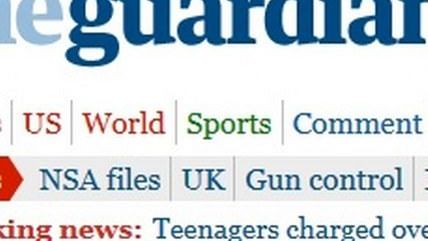Despite Its Battle With the Surveillance State, The Guardian is No Champion of the Free Press


At Spiked Online, Brendan O'Neill reminds us that The Guardian may currently be fighting the good fight against state smashers of hard drives and intimidators of journalists' loved ones, but the newspaper's institutional stance on the matter of press freedom is shaky at best. In fact, the press regulation scheme unveiled last year in Great Britain, and now the subject of vigorous debate in the country, has been championed every step of the way by the editors of that newspaper.
Writes O'Neill:
Everything that is now being done to the Guardian has already been done to the tabloid press, a hundred times over, and often at the behest of the Guardian. For all the initial depictions of Mr Miranda as 'just Glenn Greenwald's partner', in fact he was ferrying encrypted information from the NSA leaker Edward Snowden on flights paid for by the Guardian. That is, he was detained and questioned over journalistic material acquired through illegal means. That's already happened to the tabloids. Over the past two years of post-phone hacking, post-News of the World harassment of tabloid hacks by the state, 104 people have been arrested, questioned, usually put on unjustly elongated bail, and sometimes imprisoned. These include many journalists but also office secretaries and other non-journalist types, like Mr Miranda, who stand accused of handling illegally acquired material. The 104's crimes include 'disclosure of confidential information' – not that dissimilar to what Greenwald and Miranda have done in terms of getting hold of and publishing Snowden's illegally leaked confidential material. Yet while the redtop writers rot in legal limbo, Mr Miranda becomes a chattering-class cause célèbre.
To be clear, Brendan O'Neill is not suggesting that it's OK to target journalists and that Greenwald and company deserve the sort of mistreatment that tabloid journalists have received in the past. In fact, Spiked Online and O'Neill opposed the Leveson inquiry that led to the current press regulation proposals before it ever unveiled its proposals for greater state control over journalists. His point is that "the newspaper editors, politicians and concerned tweeters now getting het up about the state's interference in journalistic activity, about what they call the state's 'war on journalism', are the very same people – the very same – who over the past two years cheered the state harassment of tabloid journalists."
In fact, in December 2012, The Guardian editorialized in favor of accepting most of Leveson's recommendations for press regulation:
One possible starting point for the press and politicians would be to accept the rest of the Leveson report in full. This approach would require the press, in particular, to acknowledge the force and logic of much of his argument and to explain how it proposes to meet his challenges – including the central test of whether it is possible to achieve effective, independent regulation – without the use of statute.
That cheerleading for increased state scrutiny of the press continued into this year. In March, the paper editorialized:
To read some accounts of Monday night's Leveson vote a casual reader could be forgiven for thinking that Britain's press stands at a historic crossroads. One arrow points to freedom, the other to the end of all that Milton, Wilkes and Mill lived and died for.
The truth is rather more mundane. MPs are being asked to choose between two versions of a royal charter – a medieval piece of constitutional nonsense that fudges the issue of statutory regulation. There are good and bad things in both charters, not a straight choice between virtue and evil – and nothing in either to signal the death of press freedom. …
The Leveson inquiry was a necessary and useful examination of the ethics and standards of the press. The judge's report contained much that was sensible, along with some things that were much more contestable. It is a healthy thing, not a bad thing, that the whole issue of press regulation is the subject of open discussion and scrutiny.
None of this means that The Guardian deserved to have its offices invaded and its computers smashed, let alone that David Miranda, who had nothing to do with the newspaper's editorial stances on any issues, deserved to be detained and robbed by British authorities. What it does mean is that the editors of The Guardian should be seriously reconsidering their earlier cheerful disregard for warnings about the dangers of increasing state authority over the practice of journalism. Ultimately that power will be exercised by the sort of people who use every tool at their disposal to intimidate and abuse.


Show Comments (67)